- Home
- Bruce, Leo
Furious Old Women
Furious Old Women Read online
© 1960 by Propertius Co., Ltd.
Published in 1983 by
Academy Chicago, Publishers
425 N. Michigan Ave
Chicago, IL 60611
All rights reserved. No part of this book may be reproduced in any form, mechanical or electronic, without the advance written permission of the publisher.
Printed and bound in the U.S.A.
Second printing, 1987
Library of Congress Cataloging in Publication Data
Bruce, Leo. 1903-1980.
Furious old women.
I. Title.
PR6005.R673F8 1983b 823’.912 83-15683
ISBN 0-89733-084-6 (pbk.)
1
“ANGRY young men?” said Mrs Bobbin. “Ridiculous. Whining about their maladjustment or disillusionment or whatnot. I’m seventy-one years old, I lost my husband in the first world war, my only son in the second, and my income has been whittled down to a pittance. Now my sister has been battered to death by hooligans. If I were to start talking the self-pitying rubbish of these people there might be some reason for it. But I don’t and if I hear or read another word about ‘the beat generation’ I shall scream. Quite literally, wherever I happen to be. Now give me a cigarette and tell me how you’re going to find out who murdered Millicent.”
Carolus Deene looked at the old lady appreciatively. Seventy-one, was she? She looked twelve years younger and when she snorted as she did now she made one think of a war-horse.
“Well, I’m going to start by asking you some questions,”
“That won’t get you far. I was in London at the time as I’ve told you. But ask what you like. If it’s only to satisfy my curiosity I must know who killed Milly.”
“She was the eldest of you?”
“Yes. I came second, my brother Arthur third—he died in 1940—and Flora was the youngest. She was a late child and is only fifty-four.”
“You three sisters lived together?”
“We had done since the war, when I gave up my London flat and came down here.”
“This village was your family home?”
“Yes. We were all born here. Nothing feudal but we have lived in this house, Crossways, for three generations. Millicent and Flora never really left it. They were always wrapped up in parish affairs. I married in 1910 and didn’t return till my son was killed in 1940. I couldn’t afford to keep a home of my own and joined my sisters.”
“You liked living here?”
“Bored stiff,” said Mrs Bobbin. “Church affairs meant nothing to me and my sisters were immersed in them. Local residents pretentious and unintelligent. I was almost reduced to television. As I say, I have a right to be annoyed with life.”
“But you had no financial worries?”
“Hadn’t we? You didn’t know Millicent. She had most of the money, the largest share from my father and a big sum from my brother’s estate. Flora and I had meagre little incomes, yet Millicent insisted that we should all pay the same share. She had played the stock market for twenty years and had made herself an extremely rich woman. But you’d never have known it. Every single household expense was divided into three equal parts and we all shelled out the same. I haven’t had a penny to play with, really play with, since the very fair income left me by my husband has dwindled to nothing. I may not have been in want or hunger perhaps but there are worse things than those. There is perpetual niggling, calculating and balancing which goes on for years and never leaves one any room for a small extravagance. We had that here at Crossways.”
“Will your sister’s death relieve you of it?”
“I don’t know. The will is enormous and very complicated and most of her wealth seems to be going to help Milly’s pet church charities. But this money is so tied up with conditions on how the church is to be run that it will produce problems of its own. There’s some for Flora and me but I don’t know yet how much. Certainly not enough to compensate us for the annoyance of the murder.”
“Annoyance, Mrs Bobbin?”
“I’m extremely angry about it. Milly may have been mean and sanctimonious but she was my sister. To club her to death on her way to church was quite damnable.”
“You said ‘on her way to church’. What makes you think that?”
“Her body was found in an open grave in the churchyard. Dug for a Mr Chilling, I believe, a retired shopkeeper who lived in the village.”
“Yes, but it might have been taken there, surely?”
“I don’t think so. You will find as you come to look into this that the whole thing’s bound up with the church, just as my sister was.”
“Even so, what makes you say ‘on her way’ to church? She may have been coming away from it.”
Mrs Bobbin thought for a minute, then said, indifferently, “I suppose so.”
“It happened about a week ago?”
“Today’s Friday, so it was eight days ago. Last Thursday, February 18th. It was a dry cold day which grew cloudy in the afternoon so that the night was dark. I went up to London by the ten o’clock train in the morning and got back at eight-fifteen. I walked from the station and let myself in to find the house completely dark and empty. I at once telephoned the police.”
“No one normally slept in the house but the three of you?”
“No one. Our only domestic help is a young woman called Naomi who comes in during the day and leaves after lunch. I suppose we are lucky to have her.”
“Local girl?”
“Yes. Naomi Chester. I often wondered why she stayed with us. Millicent was unbearable with her.”
“In what way?”
“Inquisitive. My sister, Mr Deene, had rather a nasty mind and a habit of prying into other people’s lives. Naomi’s was a sad case. She is in love with a young man called Grey who married about three years ago a girl who has since been certified insane. There is a small child by the marriage and it appears that Naomi is going to have a baby by Grey. My sister’s curiosity about this embarrassed us all, particularly Naomi. But I suppose the girl continued to work for us to remain in the village near Grey. My sister Flora and I were quite fond of her.”
“Where was your sister Flora on the day of the murder?”
“She left the house during the afternoon and went by bus to Burley, the nearest town. She did some shopping, had tea at a cafe then went to the pictures. She got in soon after I did.”
“When did you first hear of your sister’s death?”
“Not till next day. We had a most worrying night, of course. It appears that next morning the sexton, a man called Rumble, who works for us in his spare time as a gardener, noticed that the grave he had dug for Chilling had been partly filled in and began to investigate. He found my sister’s body loosely covered with earth.”
Carolus Deene nodded.
“That was ingenious,” he said. “If it hadn’t been noticed and the coffin lowered the chances are the body would never have been found. It would have been just another mysterious disappearance.”
“But not quite ingenious enough. Why didn’t the murderers dig deeper? Then they would have got away with it.”
“Who was the last person to see your sister alive?”
“So far as we know, Naomi Chester. She usually leaves the house about two-thirty but was later that day. She says that there was nothing unusual when she went. My sister Flora had already caught the 2.40 bus for Burley so that when Naomi went Millicent was left alone in the house. But that was not unusual. Any one of the three of us was quite accustomed to being alone. It’s always been a very quiet and orderly village.”
“So nothing is known of your sister’s movements after Naomi Chester left her here?”
“Unless the police have discovered anything. But it’s fairly easy
to guess. My sister decided to go round to the church.”
“There was no service?”
“I think not. Mr Waddell, the vicar, did once try to introduce what he called daily evensong but the attendance was so small he had to give it up. No, I think Millicent went there for one of her chores—cleaning the brass or something.”
“Flowers, perhaps?”
“No. She disapproved of flowers in church. Millicent was what is called Low Church. Flowers were only a shade worse than candles which were anathema, while as for incense … However, you’ll hear all that in good time. She must have gone to polish her brass—she took a pride in an idiotic-looking eagle that served as a lectern—and on her way was clubbed and robbed. As simple as that.”
“But was she known to carry anything worth robbing?”
“She had a rather ostentatious taste in jewellery. There were usually enough diamonds on her to make a fair-sized tiara. And she nearly always carried a fairly large sum of money.”
“Both had been stolen, I take it, when the corpse was found?”
“Oh yes. I’ve told you she was done to death by hooligans. Damnable.”
“How did she carry the money?”
“It was my sister’s habit to carry a most capacious bag. More like a shopping basket, I often told her. In this was her purse. The bag was found with her body but the purse was missing.”
“Nothing has been recovered?”
“Certainly not. The police say they are investigating but beyond asking me a number of questions even more moronic than yours they have done nothing to my knowledge. That is why when Mrs Kensington said she knew you I told her to ring you up. I want someone hanged for this. Yes, Mr Deene, hanged by the neck till he’s thoroughly well dead. I have never been more infuriated in my life. Have a drink?”
“Thank you.”
“Whisky?”
“Yes, please.”
“I’ll get it for you. Flora’s still more or less prostrate with shock and Naomi left hours ago.”
“Naomi Chester is still working for you, then?”
“Why not? She inherited nothing from Millicent and she’s got her coming child to think of.”
Sipping his whisky and looking about him Carolus saw no sign of the ‘meagre little incomes’ ‘whittled down to a pittance’ and ‘dwindling to nothing’. They sat in the central room of the house from which a fine stone staircase curved upward to the first floor far above them. The furniture was of the eighteenth century, sherry-dark mahogany beautifully polished, and there were several good portraits.
“It is only since my sister’s death that I am able to offer you a drink in this house. Millicent was quite rabid on the subject. Not a drop of alcohol must cross the door. I often wondered whether she had some secret temptation to drink. Such violent opinions often mean that, I’m told. I drink very little myself so it was no sacrifice to me, and Millicent carried Flora with her in this as in most other things. But I like to be able to offer ordinary hospitality.”
Carolus said he appreciated it.
“Does the case interest you?” asked Mrs Bobbin sharply.
“Yes. But there are one or two things I should tell you before we go any farther. First, I do not necessarily accept your view that your sister was clubbed to death by ruffians for the sake of immediate robbery.”
“Why not?”
“It doesn’t quite ring true. That kind of murder could happen here I suppose, as it could happen anywhere in the world, but all my instincts are against it. And I don’t think thugs of that kind would have waited to cover the body at the bottom of an open grave. It’s not impossible but I don’t think that’s the way it happened.”
“Go on,” commanded Mrs Bobbin.
Carolus looked at her strong resolute face and beautiful white hair and tried not to make his words sound opinionated and peremptory.
“You see, I think it could have happened almost anywhere. It was, as you say, a dark night and there would have been plenty of time to take your sister’s body to the churchyard and cover it, for persons who knew that the grave was already dug. Moreover the actual killing could have been the work of anyone—even a woman.”
“You seem to wish to widen the possibilities instead of narrowing them.”
“Well, they are pretty wide. I take it there isn’t much known even about the time of your sister’s death?”
“I believe not. She had been under the earth for some hours.”
“So we do not know when, why, where or by whom.” “If you put it like that….”
“Then another thing I must tell you. I can’t give much time at present to investigation. The Spring term is a month old and as you know I’m a schoolmaster. I think the police will get at the truth long before I shall.”
“They may. But I’m prepared to chance that. I have one thing in common with your angry young men, Mr Deene—I do not like policemen. They are paid to protect the public and their failure to do so in the last twenty years has turned the country into a paradise for criminals while decent citizens who overstep some silly little law are harassed and persecuted. I believe the police are often corrupt and unscrupulous and I’m almost as angry when I think of their failure in this affair as when I think of the murderer’s success. If the police should hit on a solution before you it will either be a miracle or a mistake. So go ahead even if it’s a part-time job with you.”
“Your sister will wish that, too?”
“My sister is just as angry as I am over this. Perhaps angrier, in an Old Testament sort of way. She’s calling for vengeance like someone on Mount Sinai. She will be delighted if you help to discover the murderer. So far as we’re concerned you have a free hand. The case is wide open.”
“It certainly is. I have never approached anything with such a range of possibilities. If one doesn’t accept the theory of robbery one can’t even see a motive.”
“I wouldn’t say that. A number of people will benefit financially by my sister’s death. I myself, my sister Flora, our nephew Dundas Griggs, the vicar Bonar Waddell and a former chauffeur of my father’s who keeps one of the local inns, a man named George Larkin. He has a son called Bill who is also, rather unaccountably, in the will.”
“Quite a collection.”
“But as I’ve told you I’m convinced that there was nothing like a motive beyond the immediate one of robbery.”
“Had your sister any enemies?”
Mrs Bobbin considered this for a moment.
“I’m tempted to say ‘No’ because the enemies she had are so obviously unconnected with the case. But there are two women in the village who hated Millicent and believe me, Mr Deene, in a little community like this hate can be fierce. One was the vicar’s wife, Agatha Waddell. I suppose it was some kind of jealousy because her husband gave a good deal of time and attention to Millicent. Agatha is a lean and hungry-looking woman who seems thoroughly dissatisfied with life.”
“And the second?”
“The second is Grazia Vaillant, the vicar’s other best parishioner. I told you my sister’s life turned on the parish.”
“Tell me a little about this lady.”
“Grazia Vaillant, like Millicent, is rich and immersed in church affairs. Each of these women wanted her own way. But there the similarity ends. Where Millicent was downright Grazia is gushing. Millicent was Low Church, Grazia, High, which left the vicar torn between them trying to look both ways at once. Grazia is somewhat eccentric, Millicent was outwardly rather a common-place woman. Needless to say they detested one another.”
“Have you seen Miss Vaillant since your sister’s death?”
“Yes. Rather subdued, oddly enough. I think she misses Millicent’s opposition. Flora will be no match for her, so she’ll get it all her own way and the church will become so High it will stink of incense.”
“You speak as though your vicar had nothing to say in the matter?”
“What could he do between two women like Millicent and Grazia? His great a
mbition is to be all things to all men, a good mixer, popular, tolerant—you know the type. Grazia will bowl him over like a ninepin. As for the curate, he’s considered ‘good with boys’. Scouts and that.”
“Who else is on the parochial scene?”
“Only one Churchwarden who counts—Commander Fyfe. He’s not what you would imagine a retired Naval Officer to be like. Then there’s Rumble who is both verger and sexton and who found the body. You’ll meet him for yourself. I won’t spoil your first impressions.”
“Who else am I likely to meet?”
“The publican of the Black Horse, George Larkin. Perhaps you had better hear straight away what someone in the village is bound to tell you sooner or later, that is that when he was chauffeur to my father many years ago there was a scandal of some sort. I was at boarding school at the time and have never from that day to this heard the story in full but I believe he ran away with Millicent. My father found them a week later down at Brighton and everything was hushed up. Larkin had a pub bought for him up in Westmorland or somewhere on condition that he did not return here. He waited till after my father’s death then returned, since this is after all his native place. His own pub had flourished and he bought the Black Horse. He is a widower now and in his seventies though his son is barely twenty.”
“Anyone else?”
“Oh, the village has the usual local characters. Rather irritating, most of them, I find. There’s a poacher called Mugger who is rather notorious. The village policeman, Slatt, I consider to be of sub-normal intelligence but doubtless I’m prejudiced. You’ll come on others unless you produce a solution almost at once.”
“I don’t think that’s likely. It’s all too vague.”
“But tempting?”
“Yes.”
“Then do your damnedest. Because, as I say, I’m furious. This is the end. I’ve been pretty annoyed for years with this silliness called modern life. It irritates me to make no progress at all except towards old age. I could strangle the self-pitying young people who moan at the mess around them and do nothing about it. But I’ve never yet been angry on a personal score, I mean at something which happened to me. When I hear that my elder sister has been battered to death and thrown in an open grave, I find it too much. I’m livid. So don’t take too long in solving the thing. I understand you’re clever. For goodness’ sake show it. And help yourself to another drink—don’t sit looking at an empty glass.”

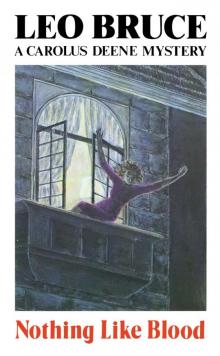 Nothing Like Blood
Nothing Like Blood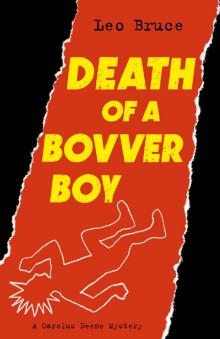 Death of a Bovver Boy
Death of a Bovver Boy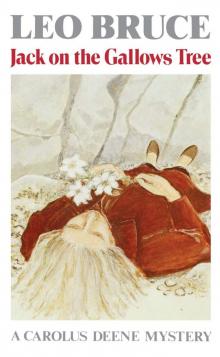 Jack on the Gallows Tree
Jack on the Gallows Tree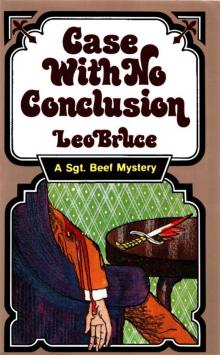 Case with No Conclusion
Case with No Conclusion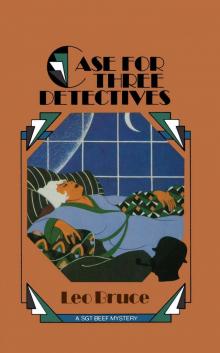 Case for Three Detectives
Case for Three Detectives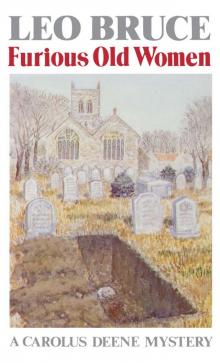 Furious Old Women
Furious Old Women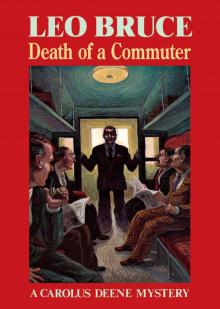 Death of a Commuter
Death of a Commuter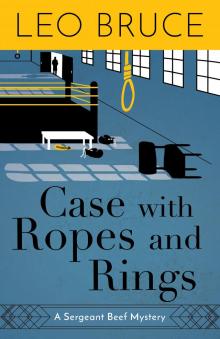 Case with Ropes and Rings
Case with Ropes and Rings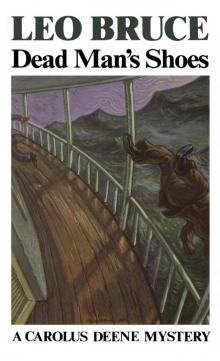 Dead Man’s Shoes
Dead Man’s Shoes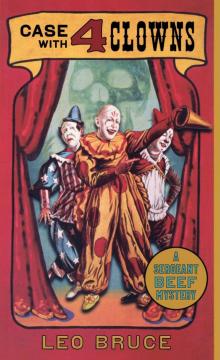 Case with 4 Clowns
Case with 4 Clowns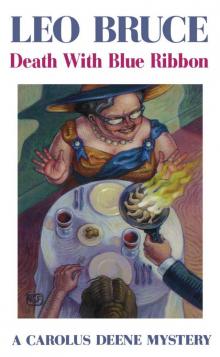 Death with Blue Ribbon
Death with Blue Ribbon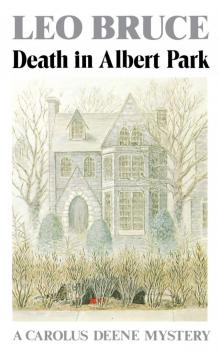 Death in Albert Park
Death in Albert Park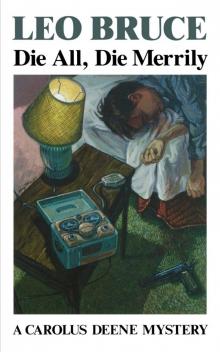 Die All, Die Merrily
Die All, Die Merrily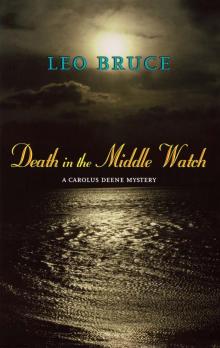 Death in the Middle Watch
Death in the Middle Watch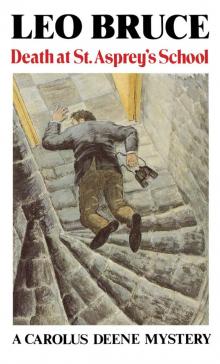 Death at St. Asprey’s School
Death at St. Asprey’s School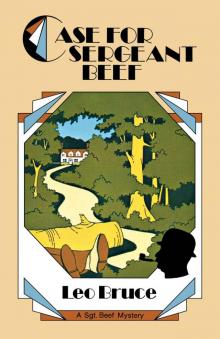 Case for Sergeant Beef
Case for Sergeant Beef